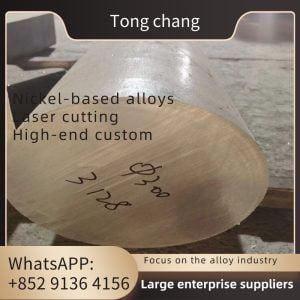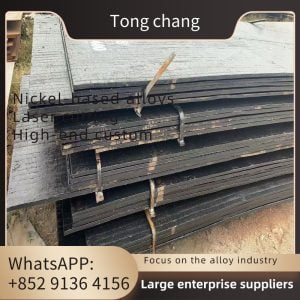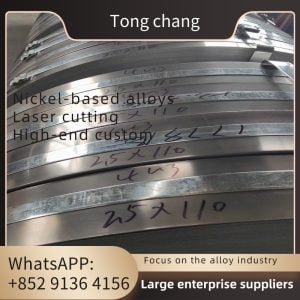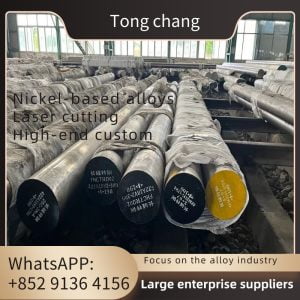| Type: | Fin Tube,Heat Exchanger Tube | Application: | Heater Parts,heat Exchanger,Refrigeration Parts,Fluid Cooling |
|---|---|---|---|
| Tube Material: | Carbon Steel,Stainless Steel,Copper Etc,Alloy Steel | Fin Material: | Aluminum,carbon Steel,stainless Steel |
| Fin Height: | 0mm-16mm,Up To 40 Mm | Color: | Silver Spiral Finned Tube,BLACK,Metal Color |
| High Light: | Stainless Steel Studded Finned Tube, ASTM A312 Finned Tube, TP316L Finned Heat Exchanger Tube | ||
ASTM A312 TP316L Studded Finned Tube Stainless Steel For Heat Exchanger
TONG CHUANG Group supply Boiler tube , Heat Exchange Tube, Air Cooling Tube , Condenser Tube more than 33 years , and our material grade contain Stainless Steel , Duplex Steel , Super Duplex Steel , Hastelloy , Monel , Inconel , Incoloy , Cr-Mo alloy , Copper alloy steel , and very year sell more than 80000 tons pipes and tubes to our client projects. And up to now we already export more than 55 countries. The pipe and tube was width used in Mining, Energy, Petrochemical, Chemical Industry, Food plant, Paper plant, Gas and Fluid Industry etc.
What is studded pipe?
Studded Pipe also called studded tubes, Studded tubes are a type of metal tubes. These tubes have studs welded onto the metal tube. These studs are arranged in a specific formation throughout the length of the tube. They are often used in boilers and refineries. As they increase the surface area for higher heat transfer they are used for reheating.
Nailhead Pipe or stud Pipe. Studded pipes are used as an alternative to finned tubes in heat exchangers mainly in the petrochemical industry where the surface is exposed to particular corrosion and aggression by gasses and vapors. Studded fin tube is a standard frequency electric-resistance-welded studded type surface. Studded pipe normally weld round carbon steed studs on carbon, alloy or stainless steel tubes with diameters from 1.5" to 12.75".
How to produce studded pipe?
Studded pipe is made by electrical resistance stud welding equipment, which specially formed Studs in rows around the tube. The Studs can be supplied in a variety of sizes and shapes. The pattrn in which the studs are arranged on the tube can also be varied by changing the Number of studs per row around the tube, the spacing between the rows, and whether the studs in adjacent Rows are offset. It is also possible to apply studs to just one side of the Tube, or to apply several different Height studs in the same row. The studs are hand loaded into the electrodes and then automatically welded. The welding process alows for the combination of any stud and tube grade, including carbon, aly, stainless sees, and high nickel aloys. After studding, alloy steel pipes are stress -elieved in accordance with the relevant specifications for the steel class
Specification
| Base Tube O.D | Base Tube Thickness (mm) | Fin Height | Tube Length (Mtr) |
| (mm) | (mm) | ||
| 38 mm ~219 mm | 4.0 mm ~20 mm | 6.0 mm ~ 38 mm | ≤ 15Mtrs |
| Base Tube Material | Fin Material | ||
| Carbon Steel ,Alloy Steel ,Stainless Steel | Carbon Steel ,Alloy Steel , | ||
| Tube O.D.: | 25~273 (mm) | 1”~10”(NPS) |
| Tube Wall Thk.: | 3.5~28.6 (mm) | 0.14”~1.1” |
| Tube Length: | ≤25,000 (mm) | ≤82 ft |
| Stud Dia.: | 6~25.4 (mm) | 0.23”~1” |
| Stud Height: | 10~35 (mm) | 0.4”~1.38” |
| Stud Pitch: | 8~30 (mm) | 0.3”~1.2” |
| Stud Shape: | Cylindrical, Elliptical, Lens type | |
| Stud to tube surface angle: | Vertical or angular | |
| Stud Material: | C.S. (most common grade is Q235B) S.S. (most common grade are AISI 304, 316, 409, 410, 321,347 ) A.S. | |
| Tube Material: | C.S. (most common grade is A106 Gr.B) S.S. (most common grade are TP304, 316, 321, 347 ) A.S.(most common grade are T/P5,9,11,22,91 ) | |
Studded pipe advantages:
Features of a Studded Tube It occupies less space and is, therefore, compact. Highly durable. Preferred over Finned tubes as they act as heat transfer systems.
Application:
Uses of Studded Tubes Steel studded tubes are used instead of finned tubes for heat transfer in the petrochemical industry, generally in furnaces and boilers where the surface is exposed to a very corrosive environment and where very dirty gas streams require frequent or aggressive cleaning.







